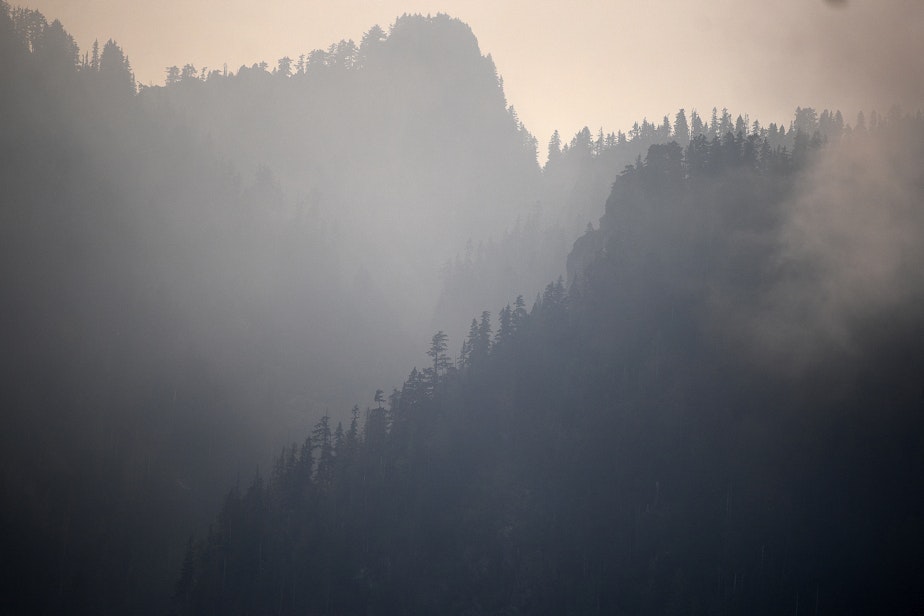WA drafts permanent rules to better protect outdoor workers from wildfire smoke

When wildfires tear through Northwest forests, pouring heavy smoke across Washington state, health officials’ guidance is often to simply stay inside. But that’s not an option for people who work outdoors.
After two years of emergency rules guiding smoke response for employers and employees, the state is drafting a set of permanent rules.
"Some workers just said you could really feel it. You could really feel it in your throat. You can feel it in your eyes. You can feel it everywhere. And the longer that you work, the worse that you feel," said Natalia Mesa, a freelance reporter based in Seattle who recently wrote on smoke rulemaking for High Country News.
As smoke from wildfires becomes a seasonal occurrence, farmworkers are facing a dilemma.
"There's so many farmworkers that just care so much about working. They care about providing for their families [and] sometimes safety just comes second for people," Mesa said. "And farmworkers, besides facing high levels of poverty and lacking medical care, are also a group that has a high rate of preexisting conditions, and wildfire smoke just exacerbates that."
Sponsored
Many workers’ livelihoods depend on being outside, and there aren’t any federal rules protecting them from smoke. That’s leaving states to adapt. For the last two years, the state of Washington has implemented “emergency smoke rules” as a stopgap measure. The rules mandated employers to have a smoke response plan, monitor air quality, and inform workers when the AQI rises above a series of thresholds.
Now the state is moving to create a permanent set of smoke rules, but there’s a lot of debate about how stringent these permanent rules should be. For worker advocates, there are questions about how the rules will be enforced.
"The rules put a lot of responsibility on the employer to follow the rules and actually inform their workers about the hazards of smoke, and people I spoke to said that some employers take it very seriously, and some don't," Mesa said.
The Washington Department of Labor and Industries (L&I) is the agency in charge of the state’s permanent wildfire smoke rules and has been in the process of crafting those rules since May 2023.
"The employer cannot dictate when and if wildfire smoke events happen, where they happen or the level they happen," said Ryan Allen, the Standards, Technical, and Lab Services senior program manager at L&I. "But there are workers out there who are experiencing those conditions. Trying to take all of that into account is a new space, and it leads to some unique challenges."
Sponsored
The current proposed rules follow in the tracks of the previous emergency rules, requiring employers to monitor worksite air quality, provide relevant PPE like respirators at various levels of AQI, and provide training for proper use of PPE and recognition of smoke exposure health symptoms.
When it comes to respirators, employers are asked to distribute and encourage the use of respirators at a 301 AQI. Use of respirators is not mandatory until 500 AQI, a rare and extreme level. The American Lung Association, however, notes that unhealthy smoke exposure begins at the 200 AQI mark, and anyone outdoors can experience health effects at that level.
"We have to consider a cost-benefit analysis. So what's the cost on an employer to make sure all their employees are fit tested, medically cleared, and shaven to wear respirators," Allen said. "Maybe people don't want to shave in order to wear a respirator. So, at what point are we going to get feasible, meaningful compliance and protection for workers. So really, 500 [AQI] was decided upon with our stakeholders, both labor and business, based on some of the feedback we were receiving throughout the rulemaking process."
For further compliance, workers can anonymously file a safety and health complaint online. If employees experience adverse health effects as a result of wildfire smoke exposure, employers are obligated to ensure medical treatment as necessary. The rules outline that workers cannot be discriminated against for using their rights to file a complaint or seek medical treatment.
L&I will also oversee a program in charge of worksite inspections, and the agency has a legal responsibility to respond to a complaint if a large number of referrals are placed.
Sponsored
The filing for permanent smoke rules is currently delayed by a few weeks, and an exact date hasn't been set.





